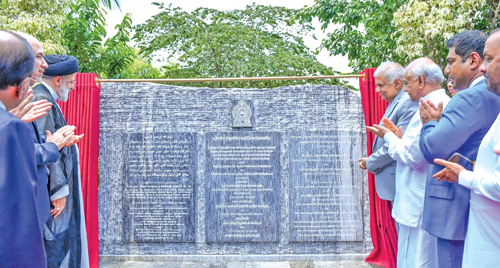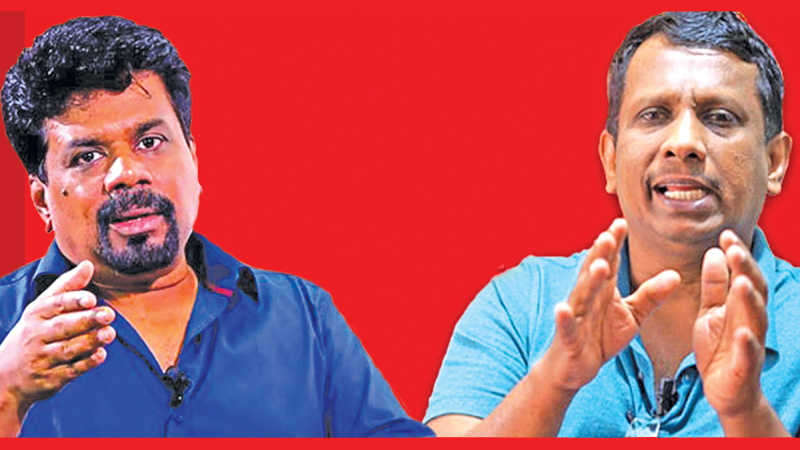On January 26, 2005, the present Janatha Vimukthi Peramuna (JVP) leader Anura Kumara Dissanayake (AKD), who served as the Minister of Agriculture, Livestock, Lands, and Irrigation at the time, submitted a Cabinet Paper for consideration (This ministry was fully under the control of the JVP with Bimal Ratnayake as its Deputy Minister). The document, referenced as No. 05/0036/039/002 and dated January 4, 2005, contained the following statement:
“The only viable solution is to utilise water from the Uma Oya to foster development in the arid southeastern region of Sri Lanka (particularly in the districts of Hambantota and Monaragela,)”
“The economic development approach for Hambantota and Moneragala districts has recently undergone a shift. There is now consideration for diverting Uma Oya to Kirindi Oya as part of the newly promoted Ruhunupura development concept.
Ruhunupura development entails transforming the Hambantota Port into a modern facility in the area, constructing an international airport, and establishing an oil refinery in the Moneragala district.
The expectation is for a significant influx of ships navigating the Indian Ocean to dock at the Hambantota port, fostering a multitude of industrial activities, notably tourism. Projections indicate that by 2030, these new developments will necessitate approximately 100 metric cubic metres of water. Given the absence of a consistent water supply in the region, sourcing water from Uma Oya is perceived as the sole viable option to fulfill this demand. Therefore prioritising this project is imperative.”
This was AKD’s Cabinet Paper.
AKD and his associates had departed from the Government by the time the Uma Oya project, sanctioned by the Cabinet for cultivating 15,000 hectares of new land, commenced in 2008. Subsequently, the Uma Oya project has been viewed from an antagonistic angle by the JVP.
The JVP’s Samantha Vidyaratne was among the leaders who opposed the Uma Oya project vehemently.
Total failure
He said, “The Uma Oya River does not possess sufficient water. This project is a total failure. It is impossible to predict the lifespan of that tunnel. There is an immense risk of it collapsing and causing devastation either within our lifetime or for the generations to come. Proceeding at such peril is a monumental folly.” JVP member Samantha Vidyaratne (July 1, 2017-Silumina)
On numerous occasions, whenever there was a positive development in the country, the JVP has often opposed it. The protest against the Uma Oya project was marked by extensive hypocrisy on one side, while on the other, there existed opposition within the JVP itself regarding initiatives aimed at benefiting the nation.
But what is the reason behind the JVP’s hypocrisy about Uma Oya?
Whether intentionally or inadvertently, the goals of the Uma Oya multipurpose scheme were outlined in the Cabinet Paper presented by then Minister AKD in 2005. One of the objectives under the Uma Oya Water Scheme is to contribute 120 MW to the national grid. The primary aim, however, is to address the drinking water shortage in the Bandarawela, Badulla, and Moneragala areas, as well as to provide water for agricultural purposes in the Badulla and Moneragala regions.
This initiative will facilitate irrigation for approximately 4,500 hectares of newly cultivated land and 1,500 hectares of existing agricultural land in the Moneragala district. Additionally, it will cater to the demand for 39 million cubic metres of water annually, fulfilling drinking and industrial requirements in the Badulla, Moneragala, and Hambantota areas, as well as the national electricity needs. The system will contribute an annual electrical capacity of 290 GWh. It was such a project that was opposed by the JVP.
Indian expansionism
No other political party in Sri Lanka has displayed as much opposition to India as the JVP. Their vocal stance against Indian expansionism has been unparalleled, as reflected in their “five classes” or Panthi Paha. The topic of the second class speaks of Indian expansionism.
Today, however, they engage with India diplomatically. During the construction of the Norochcholai Power Plant, a new form of opposition emerged. Some opportunists painted a dire picture, claiming that India’s involvement would lead to the plundering of Sri Lanka’s fish resources and pose a threat to national heritage sites like the Sri Maha Bodhi. Yet, Norachcholai now stands as a primary contributor to the nation’s electricity supply. Similarly, concerns were raised during the construction of the Mahaweli project about potential landslides due to the creation of large reservoirs.
 “The hillsides are ruined. Temples are inundated by floods. This is a grave sin,” they proclaimed. ‘It is no coincidence that the British endorse it. This agreement is akin to bowing to the whites once more. Without it, the Queen’s aid won’t come.’ That was the narrative spun by others. Today, envisioning a colossal endeavour like Mahaweli seems unfathomable. The multifaceted and extensive Mahaweli Development Program stands as Sri Lanka’s most expansive development initiative. It garnered support from the UK, Germany, Canada, and Sweden to advance its objectives.
“The hillsides are ruined. Temples are inundated by floods. This is a grave sin,” they proclaimed. ‘It is no coincidence that the British endorse it. This agreement is akin to bowing to the whites once more. Without it, the Queen’s aid won’t come.’ That was the narrative spun by others. Today, envisioning a colossal endeavour like Mahaweli seems unfathomable. The multifaceted and extensive Mahaweli Development Program stands as Sri Lanka’s most expansive development initiative. It garnered support from the UK, Germany, Canada, and Sweden to advance its objectives.
The development plan aimed to use 39 percent of the local area, leveraging the Mahaweli River, its tributaries, and Maduru Oya. Its objectives included generating the necessary electricity for the country, mitigating floods in specific regions, cultivating new agricultural lands, establishing fresh settlements, and thereby fostering new employment opportunities. The majority of these objectives have been met since.
One of the most significant gifts bestowed by the Government to the people is the ‘Suwa Seriya’ project, providing round-the-clock healthcare services to the vulnerable and impoverished residents of villages and rural areas. When introducing the ambulance service, MP Wimal Weerawansa claimed, “This ambulance service has been brought from India, and people from the RAW spy service are going to come to work here.” These allegations were found to be false and today the project provides an invaluable service to the people.
State machinery
The JVP made a disgraceful attempt to manipulate the State machinery to swiftly rebuild the lives lost by the tsunami for its own political gain. The JVP was the most vehemently opposed to the 13th Amendment.
“Members of Parliament were clandestinely detained and moved from location to location in order to secure votes for the passage of the 13th Amendment in Parliament. The Janatha Vimukthi Peramuna had issued threats to kill MPs who supported the amendment. Despite these threats, the Minister of Defence tasked me with safely transporting these MPs from the hotels where they were held to Parliament,” – S.B Karaliyadda
At the time of the Indo-Lanka Agreement, the JVP made extensive efforts to push the entire country into a crisis. A mere apology is insufficient for the actions in JVP’s past. Those engaging in Facebook campaigns in support of the JVP led NPP may have overlooked the irony of the JVP, which incited riots against provincial councils nationwide and fostered a climate of terror, later gaining prominence within those very Provincial Councils.
The Uma Oya project, initially slated for completion by 2015, faced significant delays due to opposition from the JVP, resulting in an additional nine years of construction time. This prolonged delay has resulted in considerable losses for the country.
If there is any sense of regret, JVP’s Vidyaratna and others would refrain from opposing projects like Uma Oya in the future. However, if history is any indication, it would not be surprising if the JVP continues to act in such a manner.




